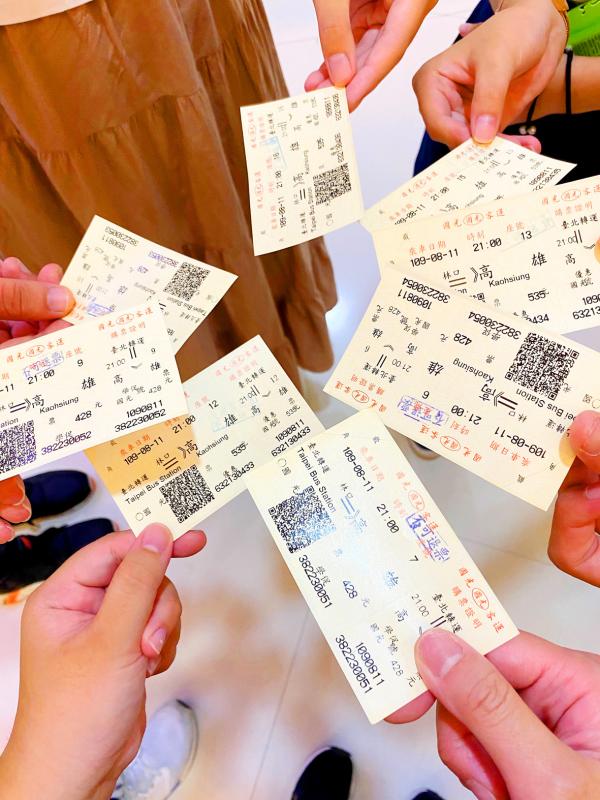A group of Taipei high-school students have circumnavigated Taiwan proper by bus in a one-day journey, which they highly recommend for the beautiful scenery and the experience of watching the sun rise over the Pacific Ocean along Provincial Highway No. 9.
Wang Yu-hsiang (王昱翔), from Taipei Municipal Yongchun Senior High School, yesterday said that the COVID-19 pandemic meant his classmates could not take trips abroad to celebrate their graduation, so he helped to plan the 24-hour trip using intercity buses.
“Journeying around Taiwan on the coastal roads has become a must for many Taiwanese, a mission to achieve in one’s lifetime. It can be done in so many ways, by walking, cycling, riding a scooter, driving a car and taking the railway,” Wang said.

Photo courtesy of Wang Yu-hsiang
With the opening this year of the improved sections of Suhua Highway from Yilan County’s Suao Township (蘇澳) to Hualien, people have found it convenient to take intercity buses around Taiwan.
Kuo-Kuang Motor Transportation (國光客運) officials said they have seen an increase in passengers, after a YouTuber posted videos of sights along the bus routes.
The high-school students also posted messages of appreciation, after they completed their journey in 24 hours, they said.
The students thanked the bus drivers for providing commentary of famous sights along the way and taking them to the best spot to watch the sunrise, they said.
Their trip started at 9pm at the Taipei Bus Station, where they took Kuo-Kuang bus No. 1838 to Kaohsiung and then transferred to Kuo-Kuang No. 1778 to Taitung County’s Jinlun Village (金崙).
From there, they took DingDong Bus (鼎東客運) No. 8135 to Taitung, where they transferred to DingDong’s Taiwan Shuttle Bus (台灣好行) for the eastern coast line to Sansiantai (三仙台).
They then took Hualien Transportation (花蓮客運) bus No. 1145 along the east coast highway north to Hualien City, and took Taipei Bus (台北客運) No. 1071 for the final leg to Taipei’s Nangang Bus Station, at a total cost of NT$1,838 per person.

MORE VISITORS: The Tourism Administration said that it is seeing positive prospects in its efforts to expand the tourism market in North America and Europe Taiwan has been ranked as the cheapest place in the world to travel to this year, based on a list recommended by NerdWallet. The San Francisco-based personal finance company said that Taiwan topped the list of 16 nations it chose for budget travelers because US tourists do not need visas and travelers can easily have a good meal for less than US$10. A bus ride in Taipei costs just under US$0.50, while subway rides start at US$0.60, the firm said, adding that public transportation in Taiwan is easy to navigate. The firm also called Taiwan a “food lover’s paradise,” citing inexpensive breakfast stalls

TRADE: A mandatory declaration of origin for manufactured goods bound for the US is to take effect on May 7 to block China from exploiting Taiwan’s trade channels All products manufactured in Taiwan and exported to the US must include a signed declaration of origin starting on May 7, the Bureau of Foreign Trade announced yesterday. US President Donald Trump on April 2 imposed a 32 percent tariff on imports from Taiwan, but one week later announced a 90-day pause on its implementation. However, a universal 10 percent tariff was immediately applied to most imports from around the world. On April 12, the Trump administration further exempted computers, smartphones and semiconductors from the new tariffs. In response, President William Lai’s (賴清德) administration has introduced a series of countermeasures to support affected

CROSS-STRAIT: The vast majority of Taiwanese support maintaining the ‘status quo,’ while concern is rising about Beijing’s influence operations More than eight out of 10 Taiwanese reject Beijing’s “one country, two systems” framework for cross-strait relations, according to a survey released by the Mainland Affairs Council (MAC) on Thursday. The MAC’s latest quarterly survey found that 84.4 percent of respondents opposed Beijing’s “one country, two systems” formula for handling cross-strait relations — a figure consistent with past polling. Over the past three years, opposition to the framework has remained high, ranging from a low of 83.6 percent in April 2023 to a peak of 89.6 percent in April last year. In the most recent poll, 82.5 percent also rejected China’s

PLUGGING HOLES: The amendments would bring the legislation in line with systems found in other countries such as Japan and the US, Legislator Chen Kuan-ting said Democratic Progressive Party (DPP) Legislator Chen Kuan-ting (陳冠廷) has proposed amending national security legislation amid a spate of espionage cases. Potential gaps in security vetting procedures for personnel with access to sensitive information prompted him to propose the amendments, which would introduce changes to Article 14 of the Classified National Security Information Protection Act (國家機密保護法), Chen said yesterday. The proposal, which aims to enhance interagency vetting procedures and reduce the risk of classified information leaks, would establish a comprehensive security clearance system in Taiwan, he said. The amendment would require character and loyalty checks for civil servants and intelligence personnel prior to